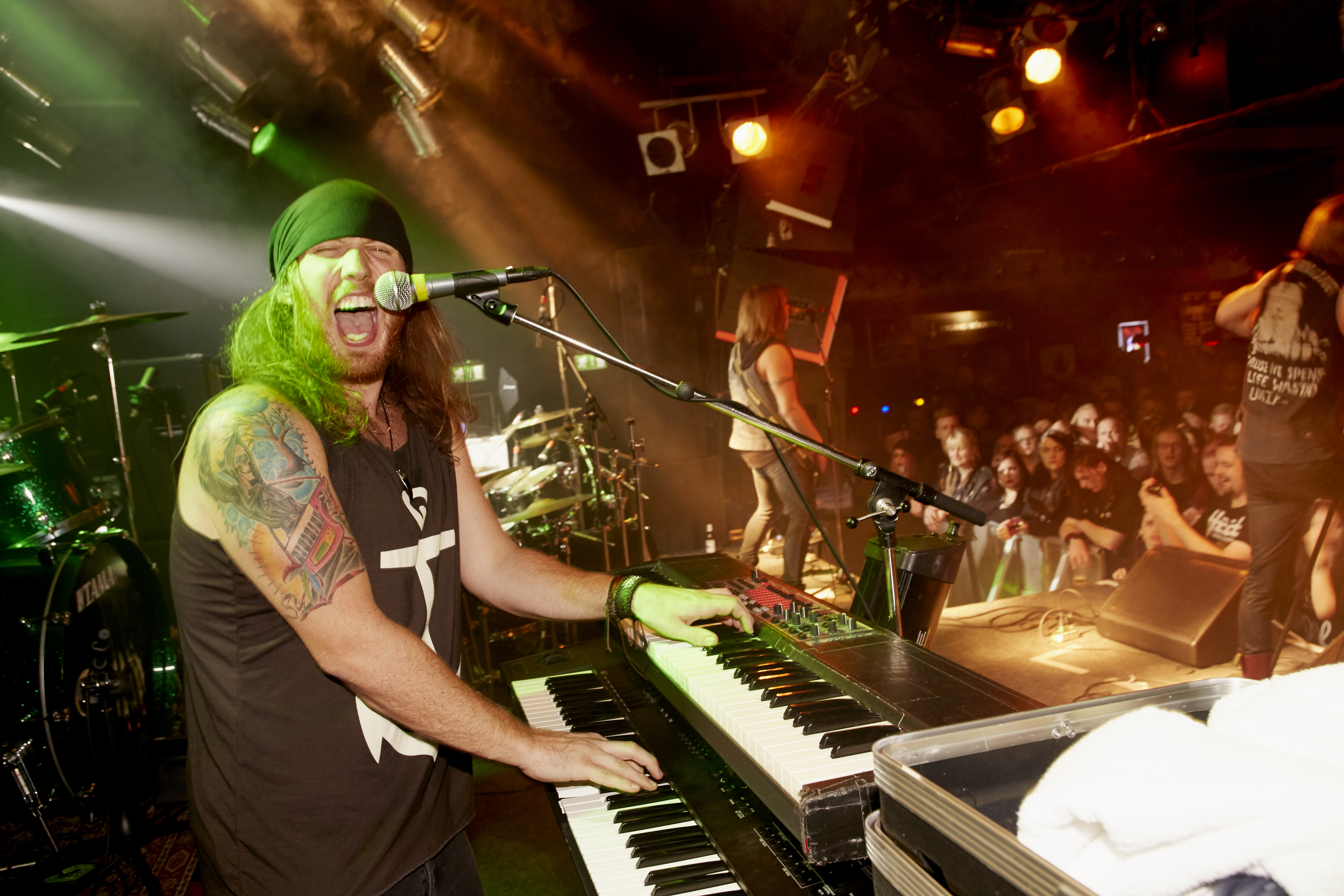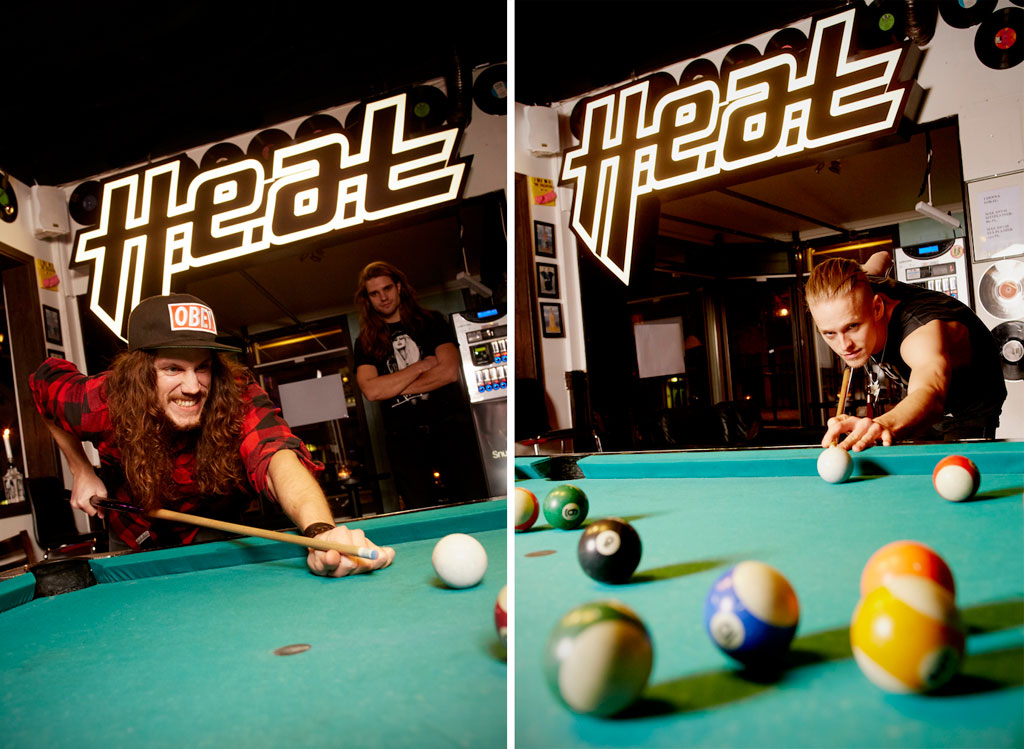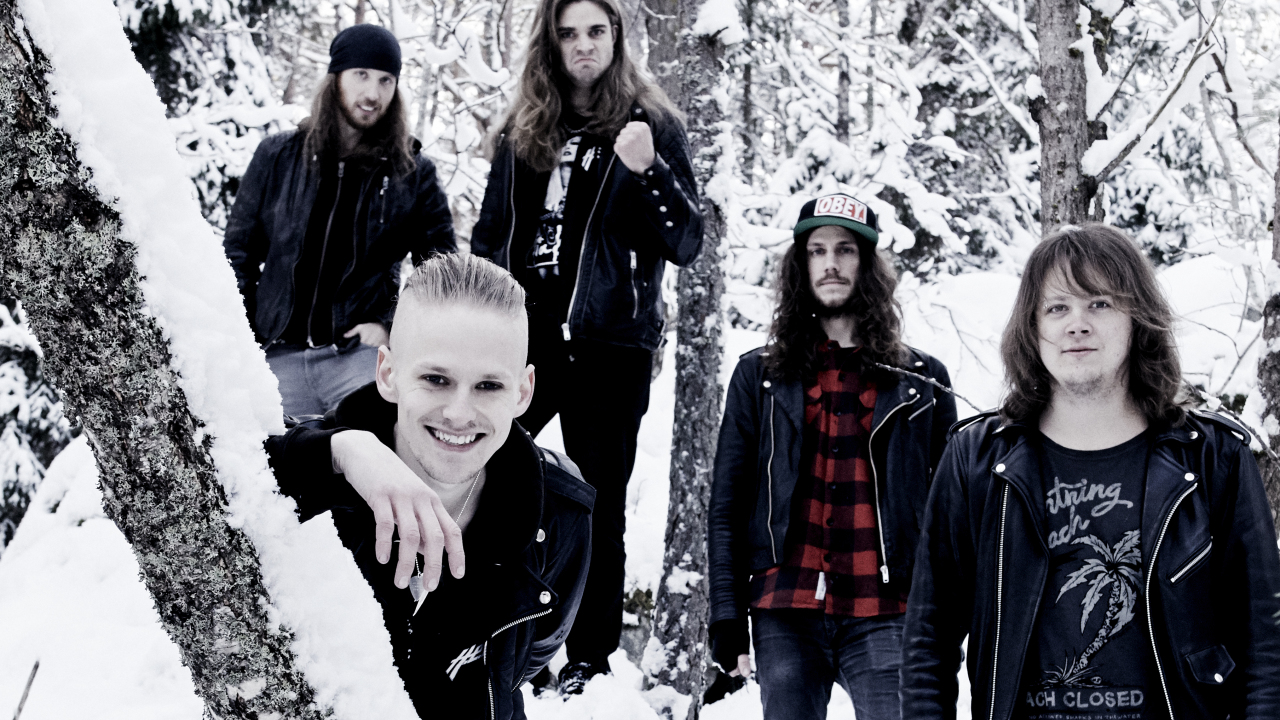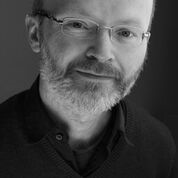In the thick snow of the woods outside Upplands Väsby, the small Swedish town that gave us Europe, its latest melodic rock hopefuls are freezing their arses off in rock’n’roll T-shirts and leather, roaring away and acting the Vikings in front of the Classic Rock camera. The occasional unimpressed kid popping up from between the pines to toboggan down the slope to town is the only other break in the winter silence.
“It’s funny,” muses Jimmy Jay, bassist with that band, the inappropriately named H.e.a.t, “we don’t associate our music with all this, we thought it had more to do with palm trees.” He sounds wistful, as he sinks into several feet of snow. “Maybe it’s because when we first made this music we were dreaming of being somewhere else. There’s a sense of escape in the music we wanted to play. Rock videos are more about beaches than dark, snowy winters.”
The sleeve of their self-titled 2008 debut album showed H.e.a.t waving goodbye on the steps of a jet plane, as if they were already international rock stars. There have been personnel changes since, but the dream has stayed alive. These five 20-somethings believe they can follow Europe out of Väsby and revive melodic rock’s halcyon days of the 1980s – a time they are, frankly, too young to remember.
They’re certainly putting in the legwork. Between them they’ve swallowed their pride and competed in the Eurovision Song Contest heats and Swedish Idol, toured from the USA to China, and supported the Scorpions to an audience of 15,000, giving their music every chance to be heard. The huge, soaring hooks on last year’s Tearing Down The Walls album suggest that all these years after their home-town heroes and Bon Jovi ruled the charts, they might just have a shot. To take it though, the old days’ coke-hoovering excesses are out.
“It is our plan to become a very big band,” singer Erik Grönwall insists. “But we’ve realised that it’s a lot of hard work to get there. You especially have to be a very good live band, and play as many shows as you can, all over the place. People were working for those bands in the eighties because they were making money, and they didn’t know how they were making money. It’s more of a normal job to be a musician nowadays, because there isn’t much money left in the industry. So you have to get up really early, carry the equipment, think about the business side of everything.
“We’re all pretty good at partying,” he adds. “But we have a rule: do whatever you want on tour, but be on stage. If you can’t perform, get out. What we’re doing here is playing music, and our fans have paid money to see a show and they don’t want to see someone too hungover to play.”
Drummer Crash is Classic Rock’s introduction to H.e.a.t, as he swerves the tour van to a halt outside Stockholm airport to pick us up. Long-haired, good-looking, easy-going, thoughtful and soft-spoken, he belies his name and a thousand drummer jokes. He sings along and beats the steering wheel to everything on the radio, from The Beatles to the jingles. H.e.a.t’s commitment to melody, it turns out, is total. “Open-mindedness is important for a musician,” Crash says. “I analyse just about any kind of music – the instruments, how the intro builds, the volume.”
Before meeting the band for tonight’s gig in Stockholm, he detours 15 miles north to Väsby’s suburban sprawl of light industrial estates and low wooden buildings, pointing out the rehearsal space, just off the highway, where H.e.a.t were founded in 2007. All of the band met in high school, with the exception of Grönwall, who’s from further north in Knivsta and replaced their original singer in 2010, the year after winning Swedish Idol, .
This is H.e.a.t heartland, where even the traffic announcer on the radio is a fan. But even here, even with Europe’s enduring impact, being a fan of melodic rock in the early noughties wasn’t easy.
“People at school were mostly into the Backstreet Boys and Britney,” Jay tells me later. “Even with the heritage of Europe, Väsby wasn’t into melodic rock. Although to this day the main hockey team still skate in to The Final Countdown. It’s the Väsby anthem.”
Tonight’s gig is at Klubb Göta, a black-walled basement more used to dance music. It was in one of its red-lined balconies that Jay asked Grönwall to join the band. During the soundcheck, the slightly built singer, his blond hair slicked back into a topknot, sings along to ABBA, Stevie Ray Vaughan and the inevitable The Final Countdown. The ‘Hadiraja’ tattoo on his arm is the name of his own, popular beer, named after a fictional Swedish scoundrel. “Hadiraja likes drinking,” Grönwall explains, “and that’s very Swedish. And he likes blowing things up with explosives. And that’s very Swedish, too.”

From check-shirted, trucker-capped guitarist Rivers – who looks half-ready to join Metallica – to quiet, Jon Lord-loving keyboard player Jona Tee, to bassist Jay, the most 80s-looking of the lot with his waistcoat and bare, tattooed arms, all five members of H.e.a.t are diligently professional, intelligent and remarkably gentle. It must be something in the Swedish air.
Niceness isn’t enough, of course. And when Grönwall buzzes into the dressing room a few hours before show time, his limbs are flailing, and his fuse fully lit. “Just had some beers with Jimmy,” he announces. “He’s a good drinker.”
“I never miss my mouth,” Jay says.
Sitting shirtless on the sofa, Grönwall leads band harmonies on Sweet Home Alabama and Bohemian Rhapsody, the shredded rock grain of his voice slicing through the small room. With an hour to go they start on Swedish drinking songs, toasting each other with cheap Swedish beer and cheaper vodka instead of the caviar and cocaine melodic rock’s old gods enjoyed. Finally they head down the cold corridor and sprint on stage, into their element.
There are older rockers at the back of the venue, but at the front it’s all gorgeous young Stockholm girls, some trying to sweet-talk security to get backstage. As Grönwall kicks and struts, hair flying as the dry ice rises, you can see why. It’s not only his looks and showmanship, but also the shamelessly huge chorus of Inferno, Tee’s weird, whistling keyboard riff on Mannequin Shop, the relentless melodies and the hammering beat. The music isn’t pushing all the way to the back. But by the time Grönwall has downed two over-generous whisky shots in one, danced with sweat whipping off his hair and a cheeky Elvis curl playing across his lips, and jumped into the audience so they can hoist him up, H.e.a.t’s first gig since December can be judged a success.
“It’s weird, actually,” ponders Europe keyboardist and local hero Mic Michaeli afterwards when I bump into him backstage. “Because I feel that we’ve moved on, and they’re playing what we used to. It is an honour. They’ve got the energy that I think we had.”

The next afternoon, H.e.a.t sit back in their Väsby ‘living room’: Jackpot Rockbar. Shoes soaked from that trip to the snowy woods are drying on radiators, the booze is free and the music is fitting, mixing Springsteen and Creedence with H.e.a.t and – oh yes – The Final Countdown. The place was just called Jackpot until Grönwall and Crash befriended the owner. Now there’s a big ‘H.e.a.t’ sign over the bar door, H.e.a.t photos and memorabilia everywhere, and a stage, for bands that Crash helps choose to play there. Grönwall has woken up in the cellar here before now.
H.e.a.t really began in 2007 when Jay, Rivers, Crash and original singer Kenny Leckremo’s band Trading Fate merged with Dream, Tee and original lead guitarist Dave Dalone’s studio-based outfit. Now, the four remaining members from those days remember competing in the televised Swedish heats for the Eurovision Song Contest as their early defining moment. The band vote on trashing their credibility to be watched by half of Sweden was three-three (they were a six-piece at the time).
“Do I think we lost something?” Rivers wonders, still gloomy at the memory. “Yeah, probably. I felt we were on to something good, and we didn’t need that to become a big band.”
Grönwall, meanwhile, had moved to Väsby from Knivsta, where “we’re just farmers, hitting each other in the face and drinking”. Having been kicked out of the metal band he was singing for, he was marking time as a karaoke host when he was spotted “shit-faced, singing Somebody To Love on stage”, and ended up winning Swedish Idol. “At that point I was like, yeah, this is my chance to work in music,” he explains. “So I took it. Maybe you don’t get too many chances.”
Stuck on a Simon Cowell-style pop treadmill, Grönwall was convinced by Europe’s Joey Tempest to escape his pop contract and join H.e.a.t in 2010, by which point they’d lost their first singer, label and management. “We didn’t have anything,” Rivers says, laughing, “and it felt awesome! It felt so good to start over and do it properly.”
The lyrics on last year’s Tearing Down The Walls album are often about being caged and breaking through. “That’s about the Eurovision and Idol history,” Grönwall sighs. “‘Oh, that fucking Idol faggot,’ and the Eurovision band, and ‘Are you really a rock band?’ We have to prove to them that we love rock’n’roll. We are a rock band, we just found other opportunities, for the publicity. Come to a show, and then tell me I don’t like rock’n’roll.”
Then there’s the whole question of melodic rock, which many struggled to take seriously even at its 80s peak. Crash has given this some serious thought.
“At first I hated Kurt Cobain for destroying that music,” he remembers. “But now I can see his point. There were so many of these hair-metal bands, even I ended up getting sick of them. There was a reason why it ended. You have to consider that I was born in 1986, so it had been dead for quite some time when I first discovered Whitesnake and thought: ‘Wow. What’s this?’ Most people thought we were super-geeky, listening to old man’s music. And melodic rock – which I’d call more hard-edged AOR – is still underground rock in Sweden. We headlined Chicago’s Melodic Rock Festival last fall, and I get the feeling it’s not that big in the States right now either, it’s a thing of the past – and rock music itself is. The most rock’n’roll thing they have in the States right now is something like Skrillex or Eminem. Melodic rock in general is mostly for old people there.”
H.e.a.t’s young audience in Stockholm the previous night shows that’s not the whole story. “No, it’s not. And the more south you go in Europe, the younger the audience. We’re bigger in Italy and Spain than in Sweden. They love all the old bands – AC/DC, Whitesnake, Bon Jovi. They think it’s super-awesome. And we can ride on that wave. It’s like when we went to China, and they reacted like I did when I first heard this music – ‘Wow! Super-cool!’ I think everyone’s had that excitement with this music. A lot of people try to deny it. But it’s the melodies, and the straight-to-the-heart hooks.”
H.e.a.t think sheer entertainment will overwhelm any prejudice. “Some people give Lars Ulrich shit because he’s not tight like they expect from a good drummer,” Crash reflects. “But he’s a kick-ass entertainer and that’s something I’ve been influenced by. Anything worth doing is worth overdoing.”
Rivers agrees: “Our old lead guitarist used to stand there and not do much, and play really good. I like to really go for it – and not play good,” he laughs.
Jay believes H.e.a.t have started to outgrow their 80s influences. “We at least think the last two albums come from ourselves,” he says. “They are what we think and feel right now.” Most of the band, though, retain some nostalgia for a decade they never lived through. “I wonder if people who were actually in the eighties thought: ‘This is the best fucking time?’” Jay wonders dreamily.
I assure him they did not.
“Exactly! People will be looking back going: ‘Oh my god, 2015 was so fucking awesome. I wish I could hang out at Jackpot…’”

After a celebratory night at Stockholm’s grand Hard Rock Cafe, the modern rock band’s slog that Grönwall warned of restarts at 5am. We’re picked up at various junctions in the dark Stockholm streets – Grönwall still in his pyjama bottoms – as the band share the seven-hour, 400-mile drive to a gig in Malmö.
Arriving at KB’s, a proper, low-ceilinged rock venue, they pass the devoted fans they’re starting to attract. Fans such as Niki and his girlfriend Irena, from Bulgaria.
“I couldn’t sleep for two nights, and now I’m exhausted. But it’s awesome, man,” says a dazed-looking Niki. “It’s worth coming two-hundred kilometers – walking, even. They are really the band of my life. I’ve been waiting six years to see them.”
Symphonic metal fan Irena agrees with H.e.a.t that “their sound is more modern now, and I can’t think of another band that sounds like them”.
“It’s an honour to meet you,” Grönwall tells them.
In the late afternoon, H.e.a.t risk being swept out to sea during another photo-shoot, standing on wave- and wind-battered rocks on Sweden’s harshly beautiful west coast, with the vast crossing to Denmark, made famous by recent TV hit The Bridge, nearby. Then it’s more long hours in a dressing room, waiting for a gig that makes everything worth it. They’re just drunk and loose enough this time. Crash drums out of his seat, sticks twirling, as much a showman as Grönwall, who shakes all over, beats his chest and somersaults off. Everyone’s playing has a wild rightness you can’t fake. You wouldn’t want to tell them that what they’re doing isn’t rock’n’roll.
“We have rehearsed so much that we can be drunk on stage,” Grönwall declares proudly. Strange figures like Sweden’s Dr AOR haunt the dressing room. There’ll be partying and flirting later, before H.e.a.t go home loyally to their girlfriends. Whatever their style of music, this really isn’t the 80s any more.
“Maybe I’m just punching holes in the entire rock’n’roll myth of every band ever,” Jay considers. “But the life of a rock’n’roller is a life of contrast. And I think being out on the road is very much real, and partying, and very extreme, and you need the counterpart to be very extreme too. And that can drive you back to your roots, and something that is familiar that really feels like home. I think Tommy Lee has a place like that too, where he can really breathe. I think that’s the taboo of rock’n’roll, to have that home. You can go out and fuck a whore when you know you have a safe place at home.”
“I get fucking shit-faced at home, too,” Crash says, clinking a glass. “But at least it’s home. Sometimes chaos brings you to rock’n’roll, and sometimes stability does.”
The success of these diligent young pros is rooted in Väsby, Swedish melodic rock’s home, a place where The Final Countdown never stops.

